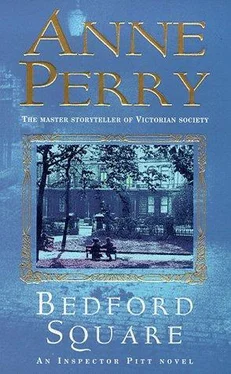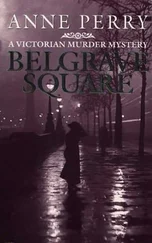Anne Perry - Bedford Square
Здесь есть возможность читать онлайн «Anne Perry - Bedford Square» весь текст электронной книги совершенно бесплатно (целиком полную версию без сокращений). В некоторых случаях можно слушать аудио, скачать через торрент в формате fb2 и присутствует краткое содержание. Жанр: Исторический детектив, на английском языке. Описание произведения, (предисловие) а так же отзывы посетителей доступны на портале библиотеки ЛибКат.
- Название:Bedford Square
- Автор:
- Жанр:
- Год:неизвестен
- ISBN:нет данных
- Рейтинг книги:5 / 5. Голосов: 1
-
Избранное:Добавить в избранное
- Отзывы:
-
Ваша оценка:
- 100
- 1
- 2
- 3
- 4
- 5
Bedford Square: краткое содержание, описание и аннотация
Предлагаем к чтению аннотацию, описание, краткое содержание или предисловие (зависит от того, что написал сам автор книги «Bedford Square»). Если вы не нашли необходимую информацию о книге — напишите в комментариях, мы постараемся отыскать её.
Bedford Square — читать онлайн бесплатно полную книгу (весь текст) целиком
Ниже представлен текст книги, разбитый по страницам. Система сохранения места последней прочитанной страницы, позволяет с удобством читать онлайн бесплатно книгу «Bedford Square», без необходимости каждый раз заново искать на чём Вы остановились. Поставьте закладку, и сможете в любой момент перейти на страницу, на которой закончили чтение.
Интервал:
Закладка:
He was too absorbed in his own thoughts to notice her silence as anything but companionable. Where should he begin with Cornwallis’s letter? How could he protect him?
2
Charlotte had been distressed to learn that the tragedy of murder had again overtaken General Balantyne, even if only in that the dead man had been found on his doorstep. But it was a public place. Certainly anyone at all might have come to it without his knowledge or any acquaintance with him.
The following morning when Pitt had gone, she left Gracie to clean away the breakfast dishes while she saw nine-year-old Jemima and seven-year-old Daniel off to school, then returned to the kitchen with the daily newspaper, brought to the step as a kindness by Mr. Williamson along the street. The first thing that leapt to her eye was the latest report on the Tranby Croft affair. Speculation was running riot as to whether the Prince of Wales would actually be called to the witness stand-and of course, what he would say. Having the heir to the throne appearing in court like a common man had never even been imagined before, much less had it happened. The room would be jammed with people curious just to stare at him, to hear him speak and have to answer questions put to him by counsel. Admission to the court was by ticket only.
Sir William Gordon-Cumming was represented by Sir Edward Clarke; for the other side, Sir Charles Russell. Present, according to the newspaper, were Lord Edward Somerset, the Earl of Coventry and Mrs. Lycett-Green, among many others.
Baccarat was an illegal game. Gambling in any form was upon by many. Cards were viewed as a waste of precious time. Everyone knew that thousands of people played, of course, but there was a world of difference between knowing and seeing. It was said that the Queen was beside herself with anger. But then she was rather a straitlaced and forbidding woman even at the best of times. Ever since Prince Albert had died of typhoid fever, nearly thirty years before, she seemed to have lost all pleasure in life and was fairly well determined to see that everyone else did too. At least that was what Charlotte had heard said, and the Queen’s rare public appearances did nothing to disprove it.
The Prince of Wales was a spendthrift, self-indulgent, gluttonous; and wildly and regularly unfaithful to his wife, the long-suffering Princess Alexandra, most particularly with Lady Frances Brooke, who was also intimately admired by Sir William Gordon-Cumming. Until this point Charlotte had had a very slight sympathy with him. Facing the court, Sir Ediward Clarke and the public would be nothing compared with facing his mother.
Then, farther down on the same page, she saw an article by one Lyndon Remus about the corpse found in Bedford Square.
The identity of the dead man on the front doorstep of the house of General Brandon Balantyne two mornings ago remains a mystery. Superintendent Thomas Pitt of Bow Street informs this writer that as yet the police have no idea as to his identity. Indeed he went so far as to say that he knew no more of it than any member of the general public.
When pressed he refused to say whether or not he intended to investigate General Balantyne, who as readers will remember, was the father of the infamous Christina Balantyne of what came to be known as the Devil’s Acre Murders which scandalised London in 1887.
There then followed a brief but lurid outline of that terrible and tragic case, with which Charlotte was all too familiar, remembering it now with a profound sense of sorrow. She could see Balantyne’s face as it had been when he had learned the truth, and everyone was powerless to help or comfort.
Now another wretchedness threatened him, and all the misery and grief of the past were resurrected again. She was furious with Lyndon Remus, whoever he might be, and her mind was filled with anxiety for Balantyne.
“Yer all right, ma’am?” Gracie’s voice cut across Charlotte’s thoughts. The little maid picked up the smoothing iron and automatically shooed Archie, the marmalade-and-white cat, from his nest on top of the laundry. He uncurled and moved away lazily, knowing full well that she would not hurt him.
Charlotte looked up. “No,” she replied. “The body that Mr. Pitt found the other night was on the doorstep of an old friend of mine, and the newspapers are suggesting that he may be somehow involved. There was an appalling crime in his family a few years ago, and they have raked that up again as well, reminding everybody of it just when he and his wife might be beginning to forget a little and feel normal again.”
“Some o’ them people wot writes for the newspapers is downright wicked,” Gracie said angrily, gripping the iron like a weapon. She knew precisely where her loyalties lay: with friends; with the hurt, the weak, the underdog, whoever he was. Sometimes, with a lot of reason and persuasion, she could change her mind, but not often and not easily. “Yer goin’ ter ’elp?” she said, looking narrowly at Charlotte. “In’t nuffin’ yer needs ter do ’ere. I can manage ev’rythink.”
Charlotte smiled in spite of herself. Gracie was a born crusader. She had come to the Pitts nearly seven years before, small and thin, in clothes too big for her and boots with holes in them. She had filled out only a little. All her dresses still had to be taken in and taken up. But she was not only an accomplished maid who knew all the duties in the house; with Charlotte’s help, she had learned to read and write. She had always been able to count. Above all, from being a waif that nobody wanted, she had turned into a young woman who was very proud of working for quite the best policeman in London, which meant anywhere. She would tell everyone so, if they appeared to be ignorant of that fact.
“Thank you,” Charlotte said with sudden decision. She closed the newspaper and stood up. She jammed it savagely into the coal scuttle and went to the door. “I shall go and visit the General and see if I can be of any help, even if it is only to let him know that I am still his friend.”
“Good,” Gracie agreed. “Mebbe we can do summink as can ’elp.” She included herself with both pride and determination. She regarded herself as part of the detective work. She had contributed significantly in the past and had every hope and intention of doing so in the future.
Charlotte went upstairs and changed out of her plain summer day dress of blue muslin and put on a very flattering gown of soft yellow, which complemented her complexion and the auburn tones of her hair. It was also cut to a very becoming shape, tight-waisted, full-sleeved at the shoulder, with a sweeping skirt and a very small bustle, as was the current fashion. It had been her one recent extravagance. Mostly she had to make do with what was serviceable and could last several seasons, with minor changes. Of course her sister, Emily, who had married very well indeed the first time and then been widowed, and was now married again, was generous with castoffs and mistakes. But Charlotte was loath to accept too much, in case it made Thomas feel more acutely aware of her step down in circumstances by marrying a policeman. And anyway, Parliament was in recess at the moment, and Emily and Jack were away in the country, on this occasion taking Grandmama with them. Even Caroline, Charlotte’s mother, was away; in Edinburgh with her husband Joshua’s new play.
But there was no questioning that this particular gown was as successful as anything she had ever worn, either owned or borrowed.
She left the house and went out into the sunshine of Keppel Street. There was no need to think of transport, as she had no more than a few hundred yards to go. It was odd to think of General Balantyne’s having moved to live so close by, and she had never encountered him. But then there must be scores of her neighbors she had not seen. And in spite of their proxfrowned imity to each other, Bedford Square and Keppel Street were socially of a very considerable difference.
Читать дальшеИнтервал:
Закладка:
Похожие книги на «Bedford Square»
Представляем Вашему вниманию похожие книги на «Bedford Square» списком для выбора. Мы отобрали схожую по названию и смыслу литературу в надежде предоставить читателям больше вариантов отыскать новые, интересные, ещё непрочитанные произведения.
Обсуждение, отзывы о книге «Bedford Square» и просто собственные мнения читателей. Оставьте ваши комментарии, напишите, что Вы думаете о произведении, его смысле или главных героях. Укажите что конкретно понравилось, а что нет, и почему Вы так считаете.












